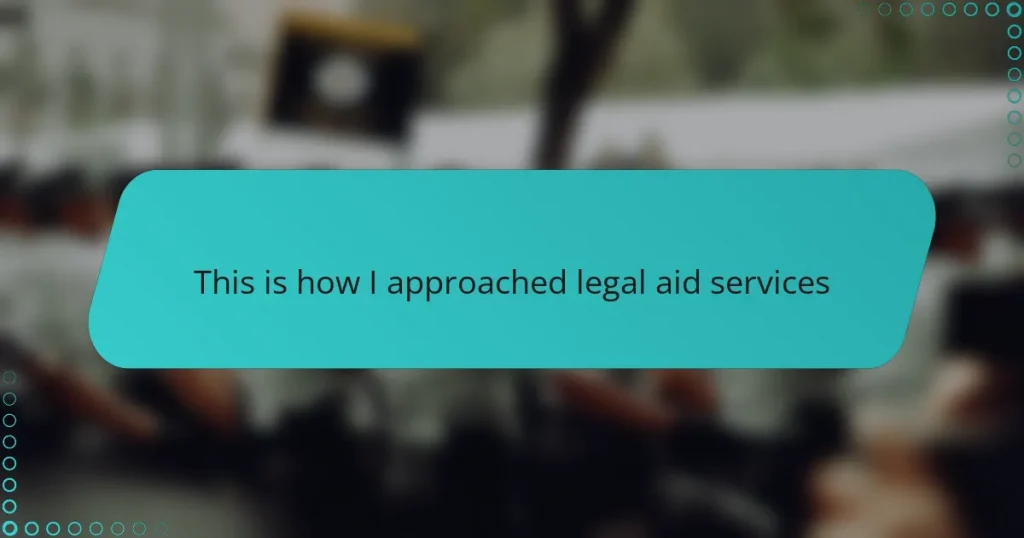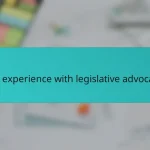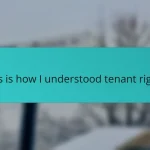Key takeaways
- Legal advocacy is rooted in empathy, integrity, and fairness, focusing on giving a voice to the unheard.
- Understanding the diverse types of legal aid services helps set realistic expectations and empowers individuals to seek appropriate support.
- Preparation for legal aid consultations, including organizing documents and formulating questions, enhances communication and confidence.
- Overcoming emotional barriers and being honest during the process fosters trust and leads to better outcomes in legal aid experiences.
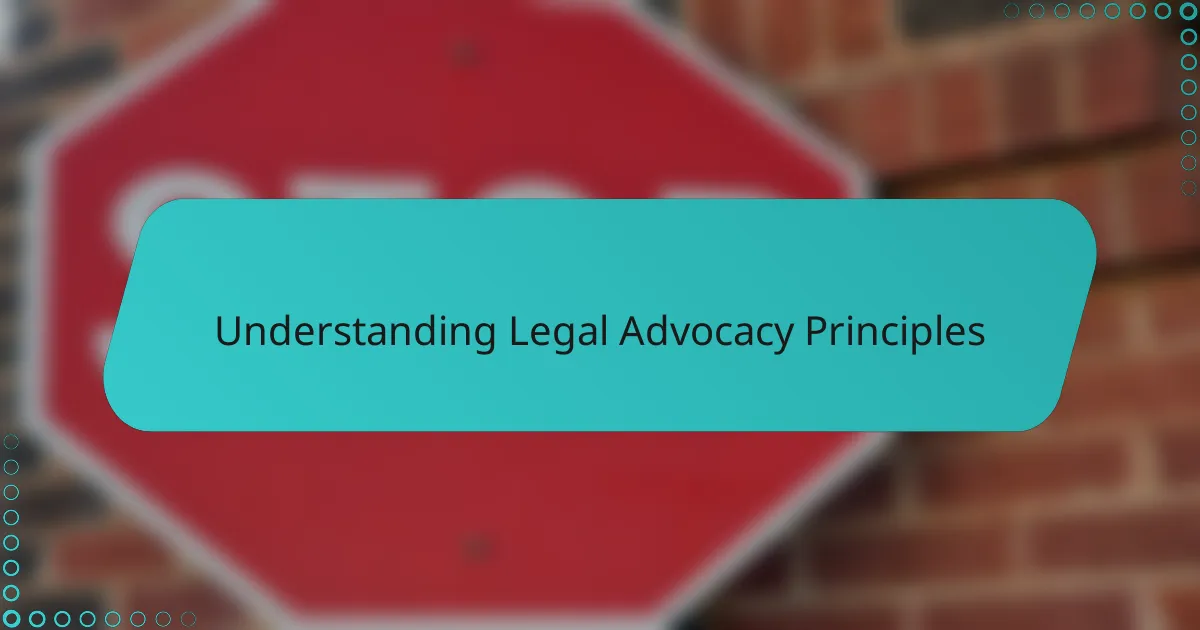
Understanding legal advocacy principles
Legal advocacy, to me, is about more than just knowing the law—it’s about using that knowledge to give voice to those who feel unheard. When I first encountered legal advocacy principles, I realized how crucial it is to approach each case with empathy and integrity. Have you ever felt powerless? That’s the feeling legal advocates strive to change.
One core principle I keep close is ensuring fairness. It’s not just about winning a case but making sure the process respects everyone’s rights. Sometimes, this means being patient and persistent, even when the path seems uphill, because true advocacy demands real dedication.
Another aspect I found essential is transparency—being honest about what legal aid can and cannot do. This builds trust, which is the foundation of effective advocacy. When I explain this to others, I often wonder, how can we empower people if they don’t fully understand their options? That clarity often opens doors to better outcomes.
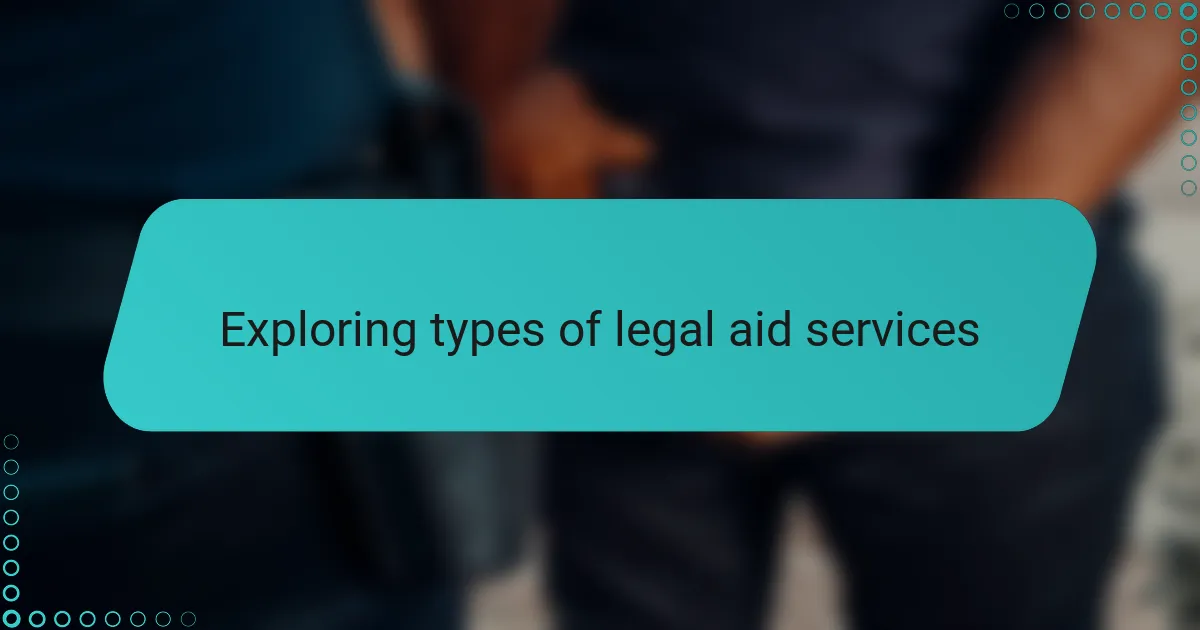
Exploring types of legal aid services
When I first started looking into legal aid services, I was surprised by how many different types there are. From direct representation to legal advice hotlines, the options seemed overwhelming at first—have you ever felt like you needed help but didn’t know where to turn? I quickly realized that understanding the range of services helps set realistic expectations and find the right kind of support.
One type that stood out to me was legal clinics, where I could speak directly with an attorney without the pressure of formal representation. These sessions felt more accessible and less intimidating, especially when I wasn’t sure if my issue warranted full legal proceedings. It gave me a sense of control and helped me feel heard from the very start.
I also found that some services focus on helping specific groups, like veterans or victims of domestic violence, which showed me how legal aid strives to tailor support. This made me think about how important it is for legal systems to meet people where they are, rather than offering one-size-fits-all solutions. Access to specialized help can truly change the course of someone’s life.
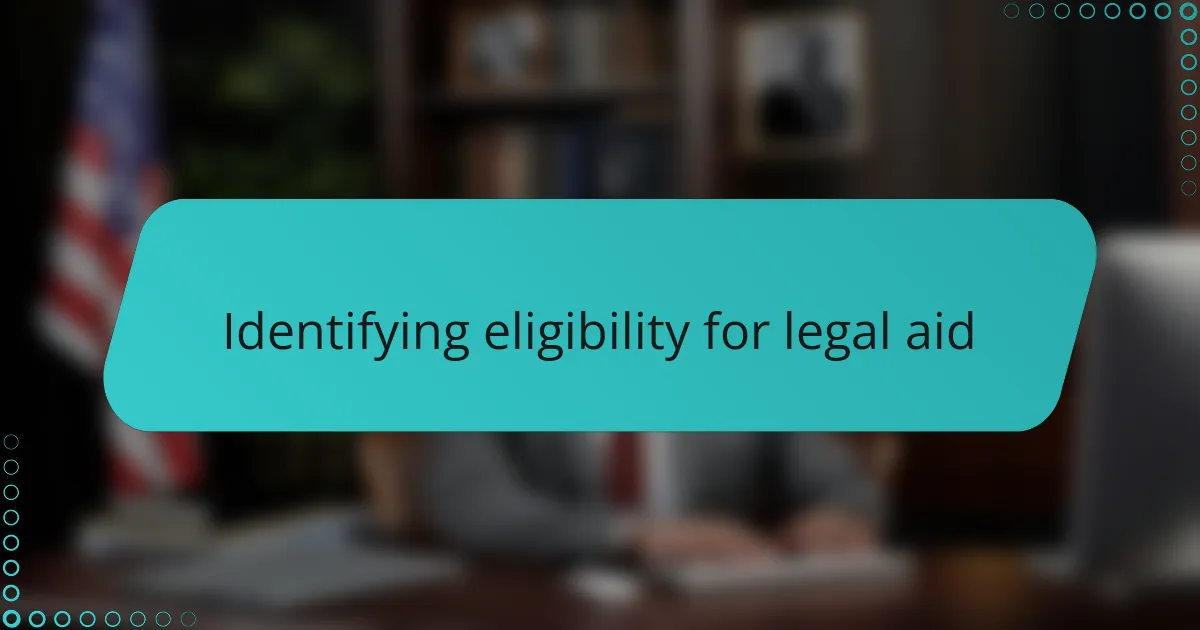
Identifying eligibility for legal aid
Figuring out if I qualified for legal aid felt like cracking a code at first. I learned it often boils down to your financial situation and the nature of your legal problem—simple, yet sometimes not so straightforward. Have you ever hesitated to ask for help because you weren’t sure if you’d “make the cut”? That uncertainty can be as daunting as the legal issue itself.
I remember hesitating to reach out because I wasn’t sure if my income was low enough or if my case was serious enough. But once I found out that many programs have clear income limits and prioritize urgent matters, it helped me take that first step with more confidence. It made me realize that eligibility isn’t about gatekeeping—it’s about making sure limited resources go where they’re needed most.
One takeaway for me was the importance of asking questions early on. When I called a legal aid office, they patiently walked me through the criteria, which made everything less intimidating. It struck me how many people might miss out simply because they don’t ask. What if more of us knew exactly how to identify eligibility—that could open the door to help that’s already there, waiting.
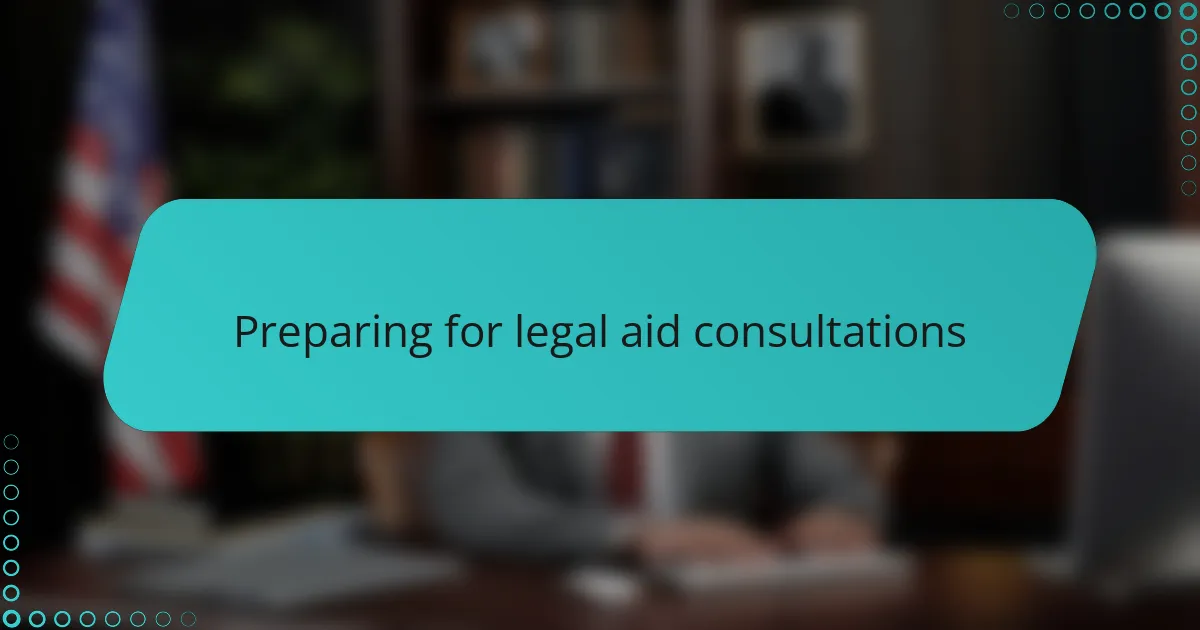
Preparing for legal aid consultations
Preparing for legal aid consultations meant getting my documents in order—it sounds basic, but I underestimated how much clarity it would bring. Have you ever shown up to an important meeting feeling scattered? Having everything organized, from contracts to correspondence, made me feel more confident and ready to explain my situation clearly.
I also took time to write down the key questions and goals I had before the consultation. It helped me focus during the conversation and made sure I didn’t forget what mattered most. Sometimes, I catch myself rambling when I’m stressed, but having a list kept me anchored.
Something I didn’t expect was how much mental preparation mattered. I reminded myself to be honest about what I knew and what I didn’t, accepting that it’s okay to rely on the lawyer’s expertise. That mindset shift changed the entire tone of the consultation—it felt like a true partnership instead of a one-sided interrogation.
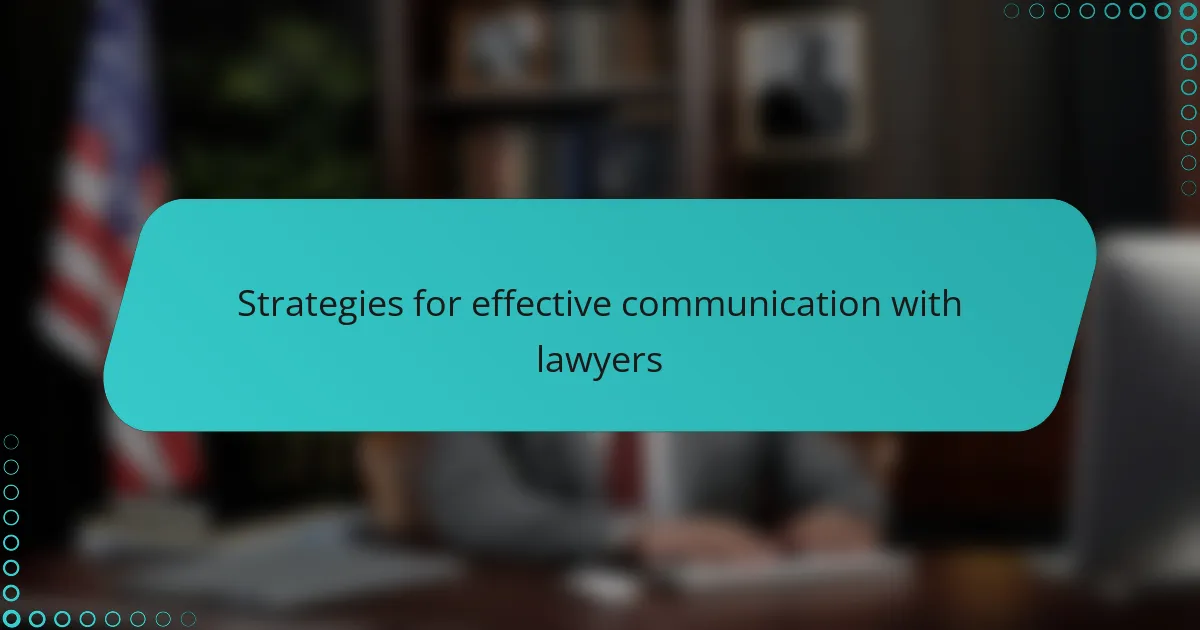
Strategies for effective communication with lawyers
Communicating effectively with lawyers took me some trial and error. I quickly learned that being clear and concise about my concerns made a huge difference. Have you ever felt like your words were lost in legal jargon? That’s why I focused on breaking down my story into simple, relevant points before each meeting.
Listening carefully became just as important as speaking. When I paid close attention to what the lawyer said—even when it was full of complex terms—I found myself asking more informed questions. This back-and-forth created a dialogue instead of a monologue, making me feel more involved and less overwhelmed.
I also discovered the power of honesty. Opening up about my fears or gaps in understanding helped my lawyer tailor explanations to my needs. Isn’t it easy to hide uncertainty, thinking it makes us look weak? In my experience, it actually built trust and led to clearer guidance, which made a stressful process feel more manageable.
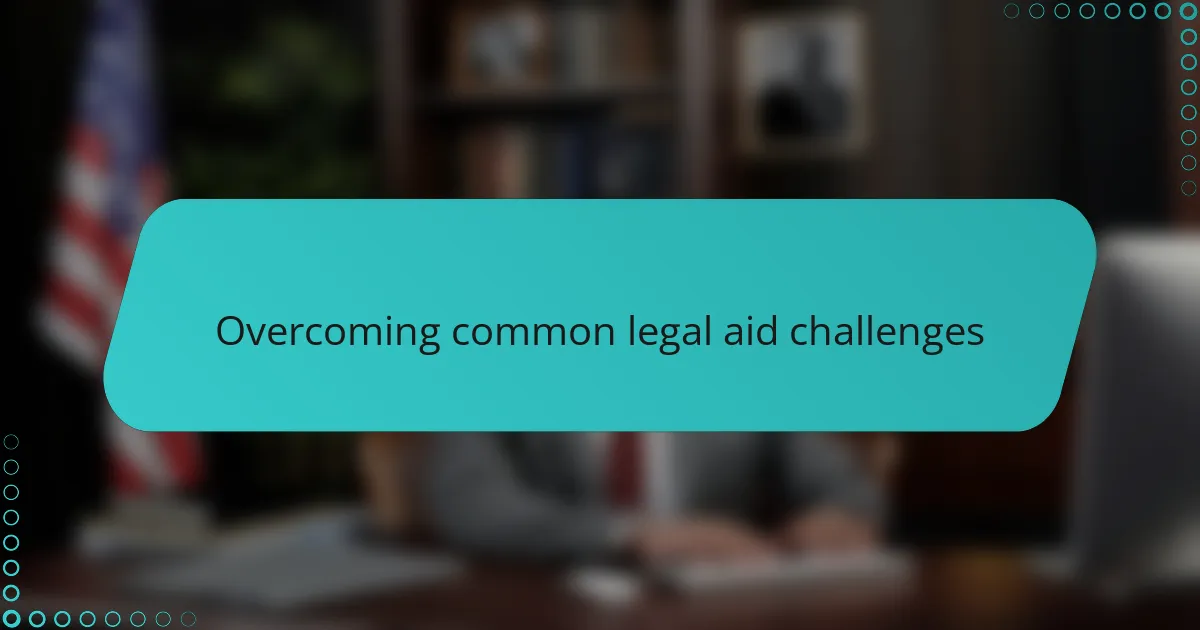
Overcoming common legal aid challenges
Facing the common hurdles in legal aid felt daunting at times. I remember grappling with limited appointment availability and wondering if waiting longer would cost me crucial time. But I found that being persistent and flexible—like calling first thing in the morning or asking about cancellation slots—actually helped me secure consultations sooner than I expected.
Navigating confusing paperwork was another challenge I didn’t anticipate. There were moments when the legal forms seemed like a foreign language, and I felt stuck. What helped me was reaching out for help early, whether from a volunteer or an advocate, rather than trying to figure it all out alone. That simple step eased my anxiety and kept things moving forward.
One lesson I learned is not to let embarrassment or fear hold me back when asking questions. Have you ever worried that your issue might seem trivial or that you’d be judged? I did, but opening up honestly to legal aid staff created a supportive space where my concerns were taken seriously. Overcoming that emotional barrier made all the difference in accessing the help I needed.
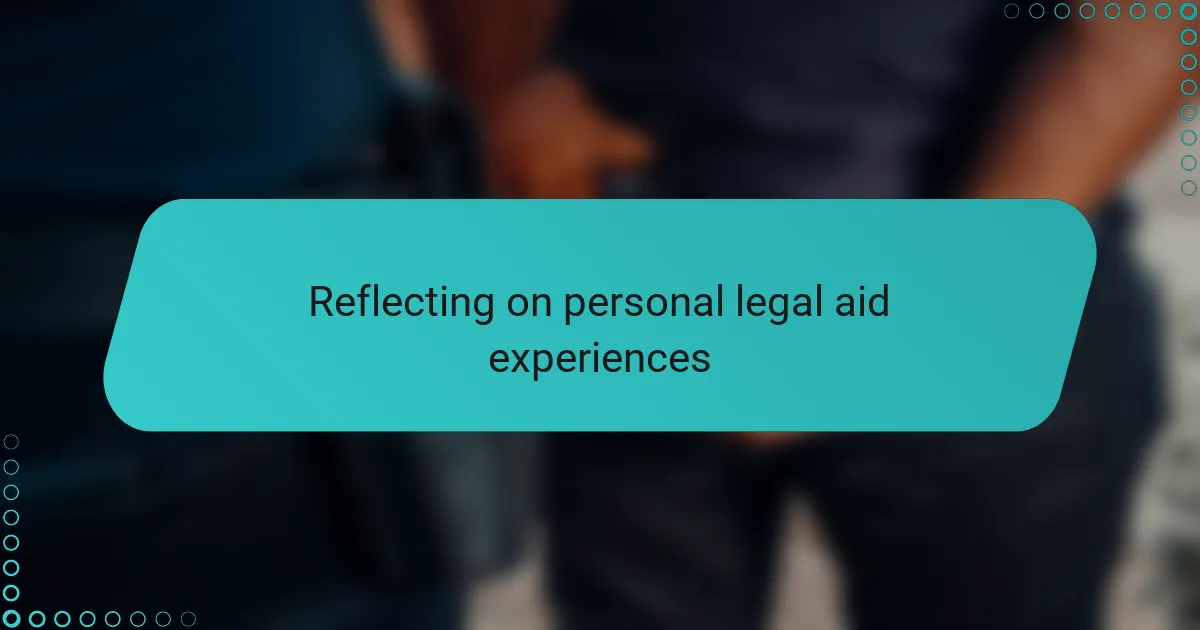
Reflecting on personal legal aid experiences
Looking back on my experience with legal aid services, I realize how much vulnerability I brought into the process. It wasn’t just about legal issues—it was about trusting strangers with parts of my life that felt fragile. Have you ever hesitated because opening up felt like admitting defeat? That fear lingered with me, but once I allowed myself to be honest, the support I received became a source of strength.
I also noticed how small moments—like a warm greeting from a receptionist or a lawyer’s patient listening—made a big emotional difference. Those interactions reminded me that legal aid is more than paperwork and deadlines; it’s about human connection. When you feel genuinely heard, your confidence grows, making the daunting process feel a bit more manageable.
At times, I questioned whether my struggles were “serious enough” to deserve help, and that doubt almost kept me from reaching out. But reflecting now, I understand that every person’s legal need is valid. What if more of us recognized that personal legal aid experiences aren’t just about cases, but about reclaiming our voice and dignity? That shift in perspective changed everything for me.
